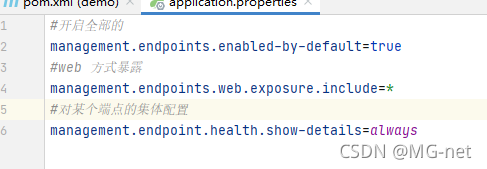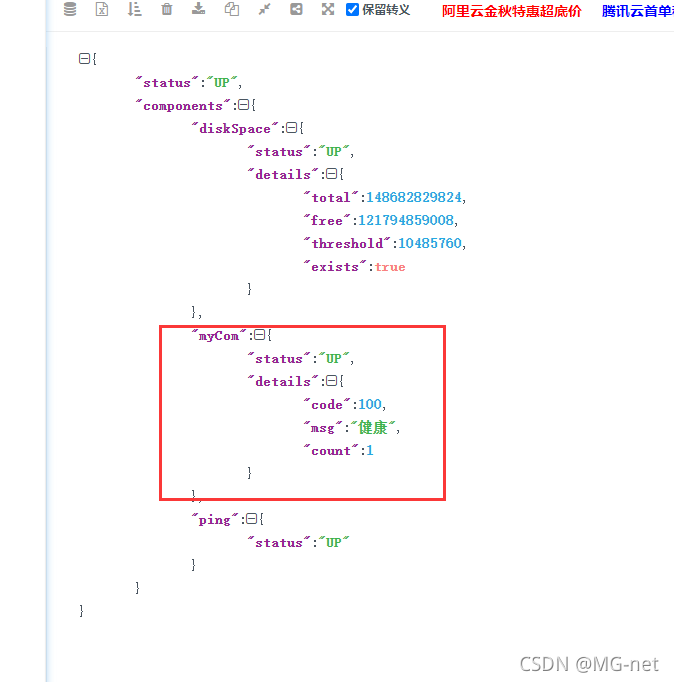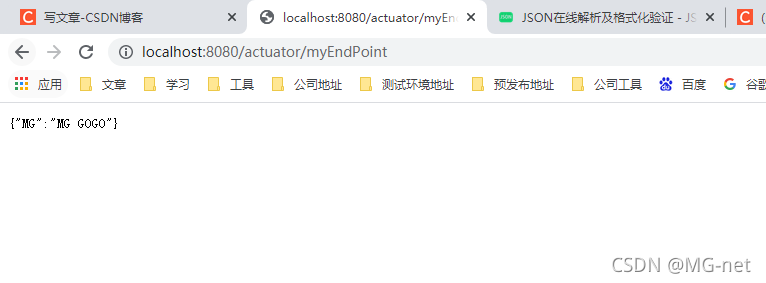一、指標(biāo)監(jiān)控
引入jar包:
<dependency>
<groupId>org.springframework.boot</groupId>
<artifactId>spring-boot-actuator</artifactId>
</dependency>

以web方式開啟:
#開啟全部的 management.endpoints.enabled-by-default=true #web 方式暴露 management.endpoints.web.exposure.include=*

二、常用的監(jiān)控端點(diǎn)
看這個(gè):傳送門
最常用的:
health:健康狀況,查看應(yīng)用是否可用

 metrics:
metrics:
運(yùn)行時(shí)指標(biāo),JVM、線程等相關(guān)內(nèi)容(重要)
 loggers:
loggers:
日志記錄
三、定制EndPoint
定制組件健康信息,比較簡單,同時(shí)也可以實(shí)現(xiàn)接口方式:
package com.example.demo;
import org.springframework.boot.actuate.health.AbstractHealthIndicator;
import org.springframework.boot.actuate.health.Health;
import org.springframework.stereotype.Component;
import java.util.HashMap;
import java.util.Map;
/**
* @author Administrator
*/
@Component
public class MyComHealthIndicator extends AbstractHealthIndicator {
/**
* 真實(shí)的檢查方法
* @param builder
* @throws Exception
*/
@Override
protected void doHealthCheck(Health.Builder builder) throws Exception {
Map<String, Object> map = new HashMap<>();
if(1==1){
builder.up();
map.put("count", 1);
map.put("msg", "健康");
}else{
builder.down();
map.put("msg", "超時(shí)");
}
builder.withDetail("code", 100)
.withDetails(map);
}
}

INFO Endpoint 的定義:
1、配置文件直接定義:
info.mavenProjectName = @project.artifactId@ [email protected]@
2、寫代碼:
package com.example.demo;
import org.springframework.boot.actuate.info.Info;
import org.springframework.boot.actuate.info.InfoContributor;
import org.springframework.stereotype.Component;
@Component
public class AppInfo implements InfoContributor {
@Override
public void contribute(Info.Builder builder) {
builder.withDetail("msg", "真他嗎帥!");
}
}
metrics定制endpoint,直接使用MeterRegistry。
自定義Endpoint,監(jiān)控端點(diǎn):
package com.example.demo;
import org.springframework.boot.actuate.endpoint.annotation.Endpoint;
import org.springframework.boot.actuate.endpoint.annotation.ReadOperation;
import org.springframework.boot.actuate.endpoint.annotation.WriteOperation;
import org.springframework.stereotype.Component;
import java.util.Collections;
import java.util.Map;
@Component
@Endpoint(id = "myEndPoint")
public class EndPoint {
@ReadOperation
public Map<String, Object> read(){
return Collections.singletonMap("MG", "MG GOGO");
}
@WriteOperation
public void write(){
System.out.println("累");
}
}
訪問自定義的指標(biāo)的時(shí)候,訪問的就是read方法

四、spring boot admin(可以使用)
準(zhǔn)備一個(gè) server,會(huì)定時(shí)去獲取各個(gè)服務(wù)的相關(guān)內(nèi)容。
<dependency>
<groupId>de.codecentric</groupId>
<artifactId>spring-boot-admin-starter-server</artifactId>
</dependency>
客戶端注冊(cè):
<dependency>
<groupId>de.codecentric</groupId>
<artifactId>spring-boot-admin-starter-client</artifactId>
</dependency>
配置屬性文件:
spring:
application:
name: admin-client
boot:
admin:
client:
url: http://localhost:8769
interface:#使用IP注冊(cè)
prefer-ip: ture
server:
port: 8768
management:
endpoints:
web:
exposure:
include: "*"
endpoint:
health:
show-details: ALWAYS
到此這篇關(guān)于spring boot 監(jiān)控的文章就介紹到這了,更多相關(guān)spring boot 監(jiān)控內(nèi)容請(qǐng)搜索服務(wù)器之家以前的文章或繼續(xù)瀏覽下面的相關(guān)文章希望大家以后多多支持服務(wù)器之家!
原文鏈接:https://blog.csdn.net/liming0025/article/details/120980720















